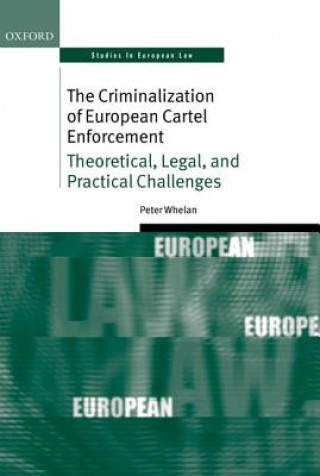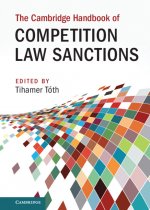
Kód: 04534597
Criminalization of European Cartel Enforcement
Autor Peter Whelan
Cartel activity is prohibited under EU law by virtue of Article 101(1) of the Treaty on the Functioning of the European Union. Firms that violate this provision face severe punishment from those entities responsible for enforcing ... celý popis
- Jazyk:
 Angličtina
Angličtina - Vazba: Pevná
- Počet stran: 398
Nakladatelství: Oxford University Press, 2014
- Více informací o knize

Mohlo by se vám také líbit
-

Care Work and Class
2240 Kč -

Death by Analysis
264 Kč -

Cultural Policy, Work and Identity
5255 Kč -

Consult Yourself
755 Kč -

Complaint
312 Kč -

ALLA LUCE DEL TEMPO
995 Kč -

Einstieg in die Cloud
1725 Kč
Dárkový poukaz: Radost zaručena
- Darujte poukaz v libovolné hodnotě a my se postaráme o zbytek.
- Poukaz se vztahuje na celou naši nabídku.
- Elektronický poukaz vytisknete z e-mailu a můžete ihned darovat.
- Platnost poukazu je 12 měsíců od data vystavení.
Více informací o knize Criminalization of European Cartel Enforcement
Nákupem získáte 513 bodů
 Anotace knihy
Anotace knihy
Cartel activity is prohibited under EU law by virtue of Article 101(1) of the Treaty on the Functioning of the European Union. Firms that violate this provision face severe punishment from those entities responsible for enforcing EU competition law: the European Commission, the national competition authorities, and the national courts. Stiff fines are regularly imposed on firms by these entities; such firm-focused punishment is an established feature of the antitrust enforcement landscape within the EU. In recent years, however, focus has also been placed on the individuals within the firms responsible for the cartel activity. It is increasingly recognized that punishment for cartel activity should be individual-focused as well as firm-focused. Accordingly, a growing tendency to criminalize cartel activity can be observed in the EU Member States. The existence of such criminal sanctions within the EU presents a number of crucial challenges that need to be met if the underlying enforcement objectives are to be achieved in practice without violating prevailing legal norms. For a start, given the severe consequences of a custodial sentence, the employment of criminal antitrust punishment must be justifiable in principle: one must have a robust normative framework rationalizing the existence of criminal cartel sanctions. Second, for it to be legitimate, antitrust criminalization should only occur in a manner that respects the mandatory legalities applicable to the European jurisdiction in question. These include the due process rights of the accused and the principle of legal certainty. Finally, the correct practical measures (such as a criminal leniency policy and a correctly defined criminal cartel offence) need to be in place in order to ensure that the employment of criminal antitrust punishment actually achieves its aims while maintaining its legitimacy. These three particular challenges can be conceptualized respectively as the theoretical, legal, and practical challenges of European antitrust criminalization. This book analyses these three crucial challenges so that the complexity of the process of European antitrust criminalization can be understood more accurately. In doing so, this book acknowledges that the three challenges should not be considered in isolation. In fact there is a dynamic relationship between the theoretical, legal, and practical challenges of European antitrust criminalization and an effective antitrust criminalization policy is one which recognizes and respects this complex interaction.
 Parametry knihy
Parametry knihy
Zařazení knihy Knihy v angličtině Law Laws of Specific jurisdictions Company, commercial & competition law
5130 Kč
- Plný název: Criminalization of European Cartel Enforcement
- Podnázev: Theoretical, Legal, and Practical Challenges
- Autor: Peter Whelan
- Jazyk:
 Angličtina
Angličtina - Vazba: Pevná
- Počet stran: 398
- EAN: 9780199670062
- ISBN: 0199670064
- ID: 04534597
- Nakladatelství: Oxford University Press
- Hmotnost: 752 g
- Rozměry: 164 × 241 × 28 mm
- Datum vydání: 07. August 2014
Oblíbené z jiného soudku
-

About Law: An Introduction
1230 Kč -

Competition Law and Policy in the Japanese Pharmaceutical Sector
4798 Kč -

Contract Law For Dummies
592 Kč -

Great Debates in Contract Law
1103 Kč -

Zahlungsdiensteaufsichtsgesetz (ZAG)
5457 Kč -

Oxford Introductions to U.S. Law
970 Kč -

Paragraph - Unternehmensrecht
525 Kč -

Anatomy of Corporate Law
1040 Kč -

English for Contract & Company Law
985 Kč -

International Construction Contract Law 2e
2937 Kč -

International Business Law
2544 Kč -

Competition Law
2506 Kč -

FIDIC Yellow Book: A Commentary
4710 Kč -

Design of Joints in Steel Structures - UK edition Eurocode 3: Design of Steel Structures Part 1-8 Design of Joints
1806 Kč -

Sarbanes-Oxley For Dummies 2e
556 Kč -

Law Express: Company Law
498 Kč -

Comparative Company Law
2078 Kč -

Copyright Class Struggle
800 Kč -

International Commercial Contracts
1578 Kč -

Cheshire, North & Fawcett: Private International Law
2515 Kč -

Core Statutes on Contract, Tort & Restitution 2018-19
244 Kč -

Practical Guide to Public Procurement
5230 Kč -

Comparative Tort Law
1205 Kč -

Cambridge Handbook of Competition Law Sanctions
6828 Kč -

Cases, Materials and Text on Contract Law
2491 Kč -

Comparative Company Law
2375 Kč -

Holiday Law
1751 Kč -

Economic Structure of Corporate Law
1430 Kč -

Foundations of Aviation Law
2255 Kč -

Regulation of Air Transport
3313 Kč -

Corporate Governance
1925 Kč -

EC Competition Law
2562 Kč -

Anatomy of Corporate Law
3606 Kč -

Law Express: Scottish Business Law (Revision guide)
460 Kč -

European Consumer Law
3930 Kč -

Contract Law
1049 Kč -

Contractual Indemnities
2264 Kč -

Comparative Corporate Governance
3313 Kč -

Privatising Public Prisons
1087 Kč -

European Commission Decisions on Competition
4262 Kč -

Theory of Collusion and Competition Policy
1022 Kč -

UWG Gesetz gegen den unlauteren Wettbewerb
1802 Kč -

General Aviation Law 3/E
1639 Kč -

Collaborative Economy and EU Law
4190 Kč -

Public Procurement and the EU Competition Rules
7059 Kč -

Economics for Competition Lawyers
4593 Kč -

More Economic Approach to EU Antitrust Law
4350 Kč -

Drafting Contracts - A Practical Guide to Transactional Practice
1701 Kč -

Law Express: Business Law
544 Kč
Osobní odběr Praha, Brno a 12903 dalších
Copyright ©2008-24 nejlevnejsi-knihy.cz Všechna práva vyhrazenaSoukromíCookies



 Vrácení do měsíce
Vrácení do měsíce 571 999 099 (8-15.30h)
571 999 099 (8-15.30h)